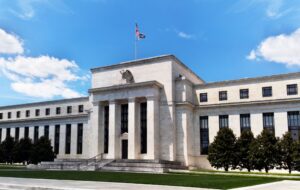
President Donald Trump’s on-again, off-again feud with Federal Reserve Chairman Jerome Powell has market observers apprehensive. Economists, policymakers, businessmen, and commentators are worried about growing threats to the Fed’s independence. If elected officials unduly influence the Fed, the conventional wisdom goes, rising inflation and financial-sector turbulence will surely follow.
America’s central bank is arguably the government’s most powerful and respected agency. For decades it has been relatively insulated from the rough-and-tumble realities of politics. Trump’s badgering of Powell for interest rate cuts transgresses an informal yet fundamental norm of public life. Fed decisions are supposed to be guided by disinterested experts, not demagogic politicians.
But does central bank independence deserve the near-unanimous respect it currently enjoys? There are reasons to be skeptical. Recent scholarship on central bank independence suggests a more nuanced view than the one adopted by the popular and financial press. And in the United States, central bank independence is legally questionable at best, and unconstitutional at worst. We have good reasons to question the feasibility and desirability of central bank independence.
In my new AIER Explainer on central bank independence, I discuss the theory and history behind this tricky concept. I go over the arguments for and against central bank independence, survey important works of scholarship on the topic, and consider the legal and constitutional standing of the Fed.
The case for central bank independence seems obvious. Rather than hand the reins of monetary policy to politicians, it is better to entrust them to experts and technocrats, who by design are unanswerable to politics. This is supposed to guarantee monetary policymakers are disinterested.
The vast majority of economists think it is a good thing the Fed has a wide berth to operate. And while they acknowledge the Fed’s legal accountability to Congress, they are pleased Congress has been unwilling to specify narrower and more observable goals than “full” employment, “stable” prices, and “moderate” interest rates.
There is a plausible link in economic theory between central bank independence and good macroeconomic outcomes, such as low and stable inflation. Come election season, politicians have an incentive to run the printing presses to make themselves look better. Bureaucrats, who aren’t elected, don’t. Hence the public and its representatives might rationally choose to remove this specific power (monetary policy) from elected officials’ hands.
It is a compelling argument. But it has several weak spots. Both scholarly investigations and legal realities complicate the triumphalist narrative of central bank independence.
While classic studies of central bank independence find a strong link between political protections for central bankers and low, predictable inflation, more recent scholarship is mixed. As I detail in the Explainer, many of the desirable economic outcomes we associate with an independent central bank are plausibly attributable to strong background commitments to constitutionalism and the rule of law. Good political institutions and a strong civic culture, rather than tenure for monetary technocrats, is how we get good economic outcomes.
As for the law, the US Constitution (art. I, § 8, cl. 5) is quite clear: Congress controls monetary policy. Whatever authority Congress gives to the Fed is not the Fed’s by right. It is a delegation. As I note in the Explainer, “The Fed’s operational independence de facto depends on Congress’s continued goodwill. Congress controls the Fed de jure and can intervene at any time to restrict goal, instrument, financial, or personnel independence.”
A totally independent central bank would violate our commitments to democratic self-governance. Although Congress has often been reluctant to discipline Fed officials, the fact remains that the legislature has the first and last word. Given the Fed’s rather poor performance since 2008 — a global financial crisis, a laboriously slow recovery, and recent sky-high inflation — it’s past time for Congress to act.
Rather than chase the mirage of independence, we should find ways to make Congressional oversight of the Fed more productive. There are many ways legislators could increase central banker accountability without politicizing the central bank. Congress could specify a more concrete monetary policy target for the Fed, put it on appropriations for non-monetary policy duties, change the conditions of continuing service for premier Fed officers, or make a host of other changes to promote responsible behavior. Let us not forget that a mere three years ago, the Fed allowed inflation to reach 9 percent, in clear violation of its price stability mandate. As of this writing, nobody at the Fed has been subject to any professional consequences for this monumental error.
It’s time to put the myths of central bank independence behind us. That includes the boogeyman of politicized monetary policy. Just because Congress can and should discipline the Fed doesn’t mean we want the House Financial Services Committee making interest rate decisions. That’s a false alternative. Instead, Congress must draw up a better framework for our central bank and make sure those who run it do their jobs.
Download the Explainer: What is Central Bank Independence?
